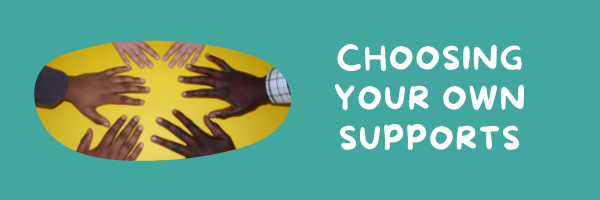Peta says that it hasn’t always been like that. In the past, she had no say in who would be assisting her, or when they would come. Often they were casual ‘fill ins’ that she didn’t know before they arrived, and they were often very late. ‘We had a talk after and we spoke about the support workers that we had just seen. I thought Pauly was very nice, and S, and L. No, not L.’ Choosing your own supportsPeople tell us that their support workers are often involved in very personal parts of their lives. They rely on them in very vulnerable times when they need assistance the most. They can be the difference between a bad day and an awesome day. Support workers are often key tools in assisting with achieving goals and getting on with living our best lives. We know that people often spend a lot of time with a support worker, so having the right person is important.
Perhaps you just want to be able to get out of bed in the morning. Do you want to be able to pursue your hobbies, play sports, try new things or learn something new? Do you need a hand to help keep things organised, like your appointments or your bills? Have a think about what your goals are; what do you want to achieve, what assistance you need and how a support worker might be able to help you to do that
Also think about what you will do in an emergency or if your support workers calls in sick.  3. Decide what skills and qualities you want in your support worker It is likely that you will spend quite some time with your support worker, so it’s important that they are the right fit for you and for your lifestyle.
If your Plan is NDIA Managed, you will need to choose your support workers from organisations that are registered with NDIA. If your Plan is Plan Managed or you are managing your Plan funds yourself, you have more choices about who you want to provide your support. You can also try to negotiate more easily. If your support worker is inexperienced, you might not want to pay maximum amounts; or if your worker has loads of experience you might want to pay more. Note, that for people who have their NDIS plan plan managed, there are upper limits that the NDIA will pay (and they might change over time). Remember that often there are different rates for different times of the day and week. Remember that there is also an industrial award that sets minimum pay rates for support workers. There are laws that set out responsibilities when engaging other people to do work. These laws outline obligations such as pay rates, tax, GST, insurances, what happens if someone is injured, superannuation etc. These responsibilities change depending on if the person is working as an employee for an organisation or individual or if they are working as self-employed contractor. It’s important to be clear about your legal obligations if you are engaging your support workers directly yourself rather than through an organisation. Where to find support workers? Traditionally support workers worked for disability support organisations and you can find workers by contacting those organisations. Now, lots of people prefer to find their support workers themselves. Some places you can look for support workers may also include:
 6. Plan for meeting and interviewing Most people prefer to interview their potential support workers before agreeing to work with them. You can organise to meet someone by phone, online (through face time, Skype or Zoom), email or in person. This will give you the opportunity to ask them about:
Also be mindful of things that are not ok to ask in an interview, because they might be considered private or could be seen as being discriminatory. If you have decided to ask a disability support organisation to provide your support workers, ask the organisation about how you can meet and interview potential support workers before they commence working with you. Some more tips for meeting, interviewing and deciding on potential support workers
 7. Know how to make an agreement Once you’ve decided on your new support worker/s, it’s a good idea to have a written agreement in place between you and your support worker or their organisation that you both agree to and sign. The agreement should set out things like:
0 Comments
Leave a Reply. |
|
For more information about the NDIA and our registration please click here
NDIS Registration Number: 405 003 6622
|
Contact Usphone:
Donna 0432 414 210 Barbel 0468 312 515 Diana 0450 739 514 PO BOX 882 Marrickville NSW 1475 |
SoverACKNOWLEDGEMENT
We acknowledge that our work is conducted on the lands of Aboriginal and Torres Strait Islander nations.
We pay our respects to Elders past, present and future, for they hold the memories, traditions, Cultures and aspirations of Aboriginal and Torres Strait Islander communities. Sovereignty was never ceded.
We acknowledge that our work is conducted on the lands of Aboriginal and Torres Strait Islander nations.
We pay our respects to Elders past, present and future, for they hold the memories, traditions, Cultures and aspirations of Aboriginal and Torres Strait Islander communities. Sovereignty was never ceded.
futures in sight - copyright: 2024







 RSS Feed
RSS Feed

